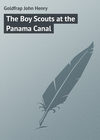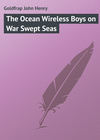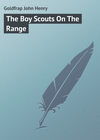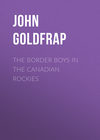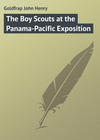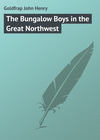Buch lesen: «The Boy Scouts at the Panama Canal», Seite 6
CHAPTER XIV
A NOVEL PROPOSAL
“Well, what do you think of my proposal?”
Mr. Mainwaring’s eyes twinkled as he regarded the three lads seated opposite him in the library of his home which he had called Ancon Hill, possibly in remembrance of that other Ancon Hill in the far off Canal Zone.
Tubby gulped; Merritt’s eyes shone and his face flushed excitedly, but he couldn’t find words just then.
“Well, Rob, what do you say to transplanting the Boy Scouts, or part of them, down along the big Ditch?”
“I – I – that is, we – it’s too big – too glorious to just realize it all at once, isn’t it, fellows?” stammered Rob.
“Pshaw! I thought the motto of your clan was ‘Be Prepared’. Now you ought to be just as much prepared to accept my invitation to go to Panama as you would be to cook a meal in a given time or light a fire with one match.”
Mr. Mainwaring regarded the young faces opposite him with a quizzical look. Then he spoke again.
“I know just what you fellows are thinking,” he said. “You’d like to go, but – ”
“It’s – it’s our folks, you see – ” Tubby managed to sputter. The others nodded solemnly. This proposal of Mr. Mainwaring’s, that while the Academy was closed they should go as his guests to the Canal Zone and see the wonders of that region, both natural and man-made, had fairly taken them off their feet, as the saying is.
“We’ll come to that part of it later,” responded Mr. Mainwaring. “I shouldn’t be surprised,” he added with a twinkle in his eyes, “if it could all be arranged satisfactorily. You see, I’m not going to take you lads down there to idle. Far from it. Idleness is the worst thing for boys or men. I’ve work for you to do. As I told you, this young scamp Jared, who is really more fool than knave, has skipped out for the Isthmus. That I have found out as you know. With him went Alverado and Estrada, the latter having suddenly resigned his diplomatic post at Washington. A third party went also, who I more than suspect is the keen-faced young man you told me you had seen in Jared’s company at the barn, at the ball game, and also on the evening Jared took his abrupt departure.
“Now, of course, they are on the qui vive on the Isthmus for this precious outfit who, undoubtedly, mean mischief of some sort. Just what it is I am not prepared to say, but I can tell you that I have a shrewd suspicion. Now you boys have plenty of pluck, resource and enterprise – don’t turn red, I’m not in the habit of flattering anybody and I mean it. You are the only people that I know of that have actually seen Alverado and who would be able to pick out this miserable, misled Jared.”
“You want us to do detective work!” gasped Tubby in an awe-struck tone.
Mr. Mainwaring laughed and threw up his hands.
“Heaven save the mark! I suspect you of reading dime novels, Master Tubby. No, there is nothing Old-Sleuth-like about what I would want you to do; nothing very thrilling or exciting about it. I’d simply want you to accompany me and maybe point out the men you have seen plotting together, for the benefit of the Isthmian police; so you see there is no danger, no glamour, no promise of adventure about it; only a hum-drum trip, but one that I am sure will prove full of interest.”
Had Mr. Mainwaring possessed a prophetic eye he might not have spoken exactly as recorded above. But not being blessed with such an organ he, of course, had no means of knowing into what danger and adventure the Boy Scouts were destined to be thrust while on the Isthmus.
“Oh, but we’d like to go!” sighed Rob.
“It’s like a beautiful dream,” struck in Merritt with a far-away look in his eyes.
“I suppose that there’s plenty to eat down that way?” asked Tubby rather suspiciously.
The tension was relieved by a hearty laugh from them all.
“Well, I only asked, you know,” remarked Tubby in an injured tone.
“And now that that’s all explained,” said Mr. Mainwaring, after the merriment had subsided, “I may as well tell you that all your parents know of my wish and are quite willing that you should go, in spite of the fact that for some weeks they will be deprived of your interesting society. And – ”
But all discipline was at an end for the nonce. The boys’ spirits fairly broke bounds. They leaped up, joined hands and danced round in a circle. It was like some impossible, glorious dream coming true; for each of them had long cherished a desire to see Uncle Sam’s wonderful digging operations which, under the Stars and Stripes, were to join two mighty oceans.
In the midst of the excitement the door opened and in came Fred Mainwaring; but Lucy was not with him, rather to the disappointment of one of the Scouts. Fred, after the boys had all shaken hands warmly and indulged in another war dance, announced that his sister had had to leave suddenly for the West the night before, as her mother, who was stopping with relatives there, had absolutely forbidden the project of taking her along.
It was not till after they had taken their leave and were walking with Fred down the drive leading to the road back to Hampton that Lucy’s brother seized an opportunity to draw Rob aside.
“What are you looking so glum about?” he demanded with a twinkle in his eyes.
“Who? Me?” rejoined Rob indignantly, “I never felt better in my life.”
But his looks belied him. And, strange to say, Rob’s gloom dated from the moment that Fred had announced Lucy’s departure.
“Say, old fellow,” laughed Fred merrily, “if you don’t remind me of the ostrich in the fable! Here, – here’s her address, – take it and be happy. Bless you, my children,” and without waiting for an answer, Fred thrust a bit of paper into Rob’s hand and darted off with a merry: —
“See you to-morrow. We’ll have lots to talk about.”
Rob rejoined his companions, who had walked on some distance ahead. His gloomy look had vanished like snow in the spring.
“Isn’t it great, glittering, glorious?” cried Merritt as he came up.
“I simply can’t believe it yet,” cried Tubby. “I’m afraid I’ll wake up like I do some nights when I’m dreaming about a banquet at which I’m an honored guest.”
“ – and I can always send postcards from the Isthmus,” breathed Rob, which remark did not seem very germane to the conversation. His companions looked at him in amazement for an instant and then, comprehending, broke into a roar of laughter, for which Rob chased them half way back to Hampton, catching Tubby at last and belaboring that stout youth till he roared for mercy.
But the fat boy had his revenge. As soon as he was released he sought a safe refuge and then, holding his staff like a guitar, he rolled his eyes upward in imitation of a troubadour, and howled at the top of his voice: —
“On a bee-yoot-i-ful night!
With a bee-yoot-i-ful gy-url!”
Rob didn’t know whether to laugh or be angry.
CHAPTER XV
OFF FOR THE ISTHMUS
The S.S. Caribbean lay at her dock at the foot of West Twenty-fifth Street, New York City, with steam up in readiness for her departure for Colon, which, as every boy knows, is the easterly port of the Canal Zone and the terminus on that side of the Isthmus of the Panama Railroad. Everything appeared to be a perfect maze of confusion. Derricks rattled, steam winches roared and wagons clattered about the dock in every direction. From the ’scape pipe of the big steamer white wisps of steam were pouring, while black smoke rolled from the squat, black funnel. At the foremast flew the Blue Peter, that blue flag with a square white center that, all the world over, signifies “Sailing day.”
Down Twenty-fourth Street, hurrying with all their might, came three boys whom, even had they not worn their Scout uniforms, we should have had no difficulty in recognizing as Rob, Merritt and Tubby. All were laden down with packages, – things bought at the last moment. The main part of their equipment was already on board. As we know, their numerous camping expeditions had provided for them so amply in that way that it had hardly been necessary to buy anything in that line. Tents, cooking outfits, and so on, they had long possessed.
But on board the ship, in the stateroom they were all three to share, reposed their proudest possessions: three blue-steel automatic revolvers with their cartridge belts, etc., and three brand new automatic rifles of heavy caliber. The latter had been the gift of Mr. Mainwaring, while the revolvers the boys had bought themselves on his recommendation. It was quite likely, it appeared, that they would explore some of the upper reaches of the Chagres River, a region infested by big snakes, jaguars and alligators, and weapons were more or less of a necessity.
Good-byes had been said early that morning when an admiring, if slightly envious, cohort of Scouts, with the village band at their heads, had escorted them to the train for New York. It had been a period of glorious excitement up to that time, but when the moment came to say the last good-byes and they had waved and given the Scout cry for the last time, the three lads felt strangely sober. This supernatural depression of spirits had endured till they reached New York, where their last shopping excursion for some time diverted their thoughts and drove away the blues. So that it was a laughing, merrily chatting trio that came at a brisk walk down Twenty-fourth Street on its way to meet Mr. Mainwaring and Fred at the steamer. All felt that their departure for the tropics meant a new epoch in their lives. As for their friends at home, the Hampton local paper had devoted a column to the lads’ departure, calling them “Hampton’s Boy Scout Pioneers.”
How much they wished that they could have brought all the Eagles with them to share their anticipated experiences! But that was manifestly impossible, and so, as the next best thing, Tubby carried a camera and an ample supply of films with which to make all the pictures he could to be shown to admiring audiences on their return.
The water front opposite the sailing place of the West India and South American ships is a busy spot. Life boils over thereabouts and the boys felt quite bewildered as they faced the broad street packed with rumbling wagons and swearing drivers and stevedores that lay between them and the dock bearing in big white letters the magic words: Panama Steamship Company.
They were just about to cross the street when their attention was suddenly distracted by the sound of some sort of scuffle or argument going on near at hand. Facing about they were not long in discovering what the trouble was. Drawn up against the curb was a small peddler’s hand-cart, covered with rosy apples piled high in tempting fashion. Behind it stood a kindly-looking old woman who just at that moment appeared to be very much flustered and excited. The cause was soon apparent.
Above the quavering voice of the old woman came a loud, blustering one that the boys were swift to recognize.
“Max Ramsay! What in the world is he doing here?”
“And Hodge Berry is with him and two other boys that look like city fellows,” struck in Merritt. “What are they up to?”
“It’s plain enough that they are plaguing that poor old woman,” exclaimed Rob, “and it wouldn’t surprise me if they had come down here to see us off on the steamer and try to make trouble of some kind. I heard they were staying with Ramsay’s cousins in the city till the school was rebuilt.”
“Well, it’s a shame, anyhow,” cried Merritt indignantly.
He had just seen what the Hampton worthies and their friends were up to. They had amused themselves by plaguing the old woman till she was half beside herself, and then, while she was berating one of them, the others would steal some apples.
“Why, it’s downright thievery,” cried Rob.
“That’s just what it is. Just what I’d expect from such cads,” cried Merritt, fully as angry.
“They look like good apples, too,” commented Tubby, regarding the fruit with the eye of an expert in such matters.
“Well, if you aren’t the limit,” exclaimed Merritt, giving him a disgusted look.
“Haven’t I got a right to give my opinion?” asked the fat Scout demurely.
“Well, of all the mean skunks,” cried Rob indignantly, with a darkening brow. “See, the poor old woman is lame. She’s got a crutch there. She can’t get after them and that’s why they are so bold.”
“Come on, and stop it,” exclaimed Merritt impulsively, “I can’t stand for anything like that.”
“Better get a policeman,” suggested Tubby prudently.
“I don’t see one in sight,” rejoined Rob; “I guess it’s up to us to stop it.”
“Here’s where I get even for that tumble I took, Scout rules or no Scout rules,” muttered Tubby to himself as the three lads advanced.
Max Ramsay was contentedly munching a big red apple as they approached. He was too much, engrossed with laughing at the anger of the old woman and the mean pranks of his friends to notice the trio of determined looking lads nearing him. He had already swooped down on the stand and was now trying to divert the old woman’s attention from the raids of his companions.
“Drop that apple, Max Ramsay!”
That was the first warning that Max had that the three Scouts from Hampton were on the scene. He and his companions had, as Rob guessed, come down to the steamer to make trouble for the boys if they could. But on the way they had stopped to divert themselves at the old apple woman’s expense.
Max turned a trifle pale for an instant, but then he bethought himself of his companions and grew defiant again.
“As if I’d drop it for you,” he said sneeringly.
Rob’s arm flashed out and seized Max’s wrist. The next instant the apple was flying across the street.
“Ouch!” grunted Max, “what are you trying to do? Break my arm? Hey, fellows!”
His companions, their attention thus drawn, rallied to Max’s support. But Rob, crimson with just anger, never noticed them. Nothing made the young Scout leader more angry than cruelty or injustice to children, the old and feeble, or dumb animals. His eyes fairly blazed now as he faced Max, who looked mean and cringing beside him.
“Now get out of this, you coward,” he exclaimed, grabbing Max’s shoulder and giving that worthy a good shove. “Be off and take your friends with you. You ought to be ashamed of yourselves, treating a poor old woman this way.”
“Let’s give ’em a good punching,” muttered Tubby belligerently.
“That’s what I say,” chimed in Merritt; but Rob held back his two fire-eating chums.
“Oh, we’re not scared of the whole bunch of you namby-pamby sissies,” cried Hodge Berry, a hulking lad who, however, took good care to keep out of reach of Rob’s fists. He had once witnessed what they could do and had no desire for a personal experience. Now Max’s two city cousins chimed in.
“Why don’t you give those toy soldiers a good hiding?” said one.
“Yes; those Boy Scouts are too dern busy,” put in the other, a pale-faced, pimply lad of about seventeen.
But despite these brave remarks, neither of them made any effort to back up Max or Hodge Berry.
“All right for you. We’ll fix you some time,” snarled Max.
“Why not do it now?” inquired Tubby. “You’re four to three, that’s good odds.”
“Oh, we could lick you if we wanted to. We’ll do it, too, when you get back from Panama, if you ever do. I hope the ’gators eat you.”
“Thank you,” said Rob, laughing in spite of himself; “and as for fighting you fellows, why I don’t much believe in it, but if you don’t make yourselves scarce, I’ll give you rowdies a lesson you won’t forget.”
“Yah-h-h-h-h!” was all that the apple raiders could think of to say, but they faded away from the scene in as dignified a manner as they could muster.
The three Scouts then bought some apples from the old woman, who poured out her thanks so profusely that a small crowd began to gather about her and listen.
“Come on, fellows,” said Rob, “let’s get out of this.”
They hurried away, followed by the old woman’s “Wurra wurras,” and “God bless yez fer foine byes now, even if ye do wear haythenish clothes.”
When they were out of earshot, Rob turned his attention to his badge, which he was wearing upside down. Like many other Scouts, he didn’t turn it the right way up till he had lived up to the Scout rules of doing a daily kind deed. He now turned his badge the right way and so did his chums, who had adopted this rule also.
“I’d have felt better if I could have got a good crack at those chaps, though,” said Tubby between bites at his apple.
Suddenly a steamer’s whistle boomed out above the dock-side uproar.
“Gee whiz, fellows, that’s the ‘all ashore’ whistle. We’ve got to hustle!” cried Rob.
The three Scouts broke into a run, each congratulating himself that he could present himself before Mr. Mainwaring with an “upturned badge.”
CHAPTER XVI
SOMETHING ABOUT THE CANAL
“Suppose you tell us what you know about Panama and the canal?” remarked Tubby to Rob as the three boys perched in the bow of the Caribbean, three days out, watching the flying fish as the vessel’s prow sent them scattering like coveys of birds from big patches of yellow gulf weed.
“Yes, that’s a good idea,” supplemented Merritt, “I guess we won’t get much time to study books down there. Mr. Mainwaring said this morning that, after he had given the work a preliminary look-over, he was going to hunt for the source of that tributary of the Chagres that he thinks is responsible for the big floods every rainy season.”
“Well, I don’t suppose I know much more about it than you two fellows do,” rejoined Rob modestly, “but I’ve been reading up on it.”
Here he looked at Tubby, who had done nothing much on the steamer but consume three huge meals a day, with “snacks” in between, and amuse himself. One of these amusements had been stuffing some of those odd-looking pills known as “Pharaoh’s Serpents” into the captain’s pipe. Almost every boy can guess what happened when the glowing tobacco reached the “Serpents” and big, wriggly, writhing things began to climb out of the pipe bowl.
“Ach himmel, der sea serpent,” yelled the skipper, who was a German.
“Oh-h-h-h-h-h!” screamed a lot of ladies to whom he happened to be talking.
It was just at this juncture that the captain had caught sight of Tubby doubled up with laughter behind a ventilator. He chased and captured the fat youth, who then and there received a spanking for which he got no sympathy, even from his fellow Scouts. Except for spilling “sneezing powder” in the main dining room at dinner time and burning an old gentleman’s bald head by sun rays concentrated in a magnifying glass, Tubby had done nothing out of the way since.
“Fire away. Unload your knowledge,” ordered Merritt, luxuriously stretching out under the awning.
“All right, here goes. To begin at the beginning, of course you know that Panama was discovered by Christopher Columbus in 1502.”
“Ginger snaps!” interrupted Tubby. “Is there anything, except Coney Island, that he didn’t discover?”
“Shut up, can’t you,” cried Merritt indignantly. “Go on, Rob, it’s just the nature of the beast. Never mind him.”
“Well,” resumed Rob, “Columbus discovered the Chagres River and sailed up it. He called the beautiful harbor by which he entered it Porto Bello. Then came Balboa, who was the first to cross the Isthmus and view the Pacific. It was about this time that a road was built across and the city of Panama founded on the Pacific side. It was from Panama that Pizarro set out to begin his brutal campaign which ended in the practical extinction of the Incas of Peru.”
“Oh, cut out the history and let’s get down to the canal,” muttered Tubby; “I hate history, anyhow.”
“It’s my belief that you like nothing but eating,” declared Merritt indignantly.
“And sleeping,” put in Tubby without a smile.
“The road was fifty miles long and well paved and provided with substantial bridges, some of which are yet standing although the road is almost impassable,” went on Rob. “It was the war between Mexico and Uncle Sam in 1846-47 that brought about a change. But in the meantime, I forgot to tell you that old Panama was sacked by Captain Henry Morgan and his pirates in 1671, great stores of gold taken and the inhabitants put to the torture. The city was never rebuilt, but its ruins still stand some miles from the site of the present city.”
“Well, what happened in the Mexican war?” asked Tubby.
“I’m coming to that. At that time there were not more than 9,000 miles of railroad in America, and it was a hard matter to get as far west as Chicago by rail.
“Between the East and the Pacific Coast lay great prairies, practically unexplored. Indians were thickly scattered over this region and very hostile to the white man. The journey across took months. The lack of a short route to the Pacific coast set everybody to thinking. Then, in 1849, came the great gold rush to California. Hundreds of miners went by way of the Isthmus, but there was no railroad and they got sick, and many of them died on the way across. It became clear that there must be a railroad and, at last, in 1855, after unheard of difficulties had been mastered, one was completed with American capital.
“From the first it paid tremendously, in the space of forty-seven years making $38,000,000 of clear profit for its projectors. But to build that forty-eight miles of track had cost 2,000 recorded human lives, five years of labor, and $8,000,000.”
“First history, then a railroad year book, and now, I suppose, we’ll get down to the canal,” grunted Tubby.
“Yes, that’s coming now,” smiled Rob. “In the first place, the idea of building a canal across the narrow strip of land forming the Isthmus had been a dream even of the early Spaniards. Then a Scotchman founded a colony which was to grow rich on the products of the Isthmus and also dig a canal. Disease and failure soon put an end to this enterprise. In fact, from the earliest days Panama and the Isthmus have always been known as one of the most unhealthy spots on earth. As you may know, it is only nine degrees north of the equator, and the rainy season lasts more than half the year. But nowadays, with modern medicine and modern hygienic methods, it is quite safe, with reasonable care, to penetrate the jungle. Mr. Mainwaring told me that,” he added.
“Well, after various schemes had been gotten up and had fallen through, a French company, backed by the money of almost everyone in France who could by hook or crook secure stock, in 1882 turned the first shovelful of earth for a canal. It was to have been a sea-level one, that is, one without locks, and was projected and engineered by Ferdinand De Lesseps, the aged builder of the Suez canal.
“We know now that a sea-level canal would not be feasible on the Isthmus. It would take too long to build and cost a prohibitive sum, almost double what a lock canal costs. For seven years digging went on, with fearful loss of life among the laborers and engineers from yellow fever. Then, in 1899, it was discovered that almost half of the $400,000,000 raised had been squandered in mismanagement and waste, and by far the larger part had gone in what we should nowadays call ‘graft’. An investigation was made. Several of the promoters of the canal committed suicide, and De Lesseps went mad and died in an asylum. Such was the tragic history of the French era; but brighter days were to come.
“It was in 1898 when the Oregon made her record run from San Francisco to join the Atlantic fleet in the West Indies and fight the Spaniards off Cuba, that Americans began to think that a short cut was needed. With our acquisition of the Philippines, a ‘door’ between the Pacific and Atlantic was declared to be almost a necessity. There was much discussion at Washington, but finally in 1903 President Roosevelt and Congress decided that if we could purchase from the French all they had left at Panama and could, in addition, buy a strip or ‘zone’ across the Isthmus for canal building purposes, it would be fitting and right for the United States to take up the work.
“After some dickering, the French company, took $40,000,000 for what they owned, and, in 1904, the Panama Republic, a newly created nation, sold the United States for $10,000,000 a strip of land ten miles wide and fifty miles long, which strip of land is now known as the Canal Zone.
“The first thing that the Americans did after they took hold was to start a campaign against disease. No canal could be dug while yellow fever had to be reckoned with. Under the masterly hand of Col. W. C. Gorgas, the Zone has been cleaned up till disease is almost rarer than in cities of the north. Mosquitoes have been wiped out, streets paved, filth and garbage, which used to lie and rot under the hot sun, all swept away, and good comfortable houses put up for workmen and their bosses. The men who stand the climate best among the laborers are Jamaican negroes. Hindus, Italians and Spaniards are also employed for lighter work, but for ‘making the dirt fly’ the Sambo is the real thing.
“Anything else you’d like to know?”
“Well, yes,” said Merritt. “Just why is this Chagres River such an important part of the canal?”
“Well, it’s this way, as I understand it,” said Rob. “In the first place, the canal is fifty miles long, – forty-one miles through the land and nine miles of channel dredged out in the harbors of Colon and Panama. From Colon to Bah Bohia the route passes for twelve miles through low, swampy ground not much above sea level. Then it cuts into the hills and is practically a more or less shallow ditch as far as a place called Miraflores, nine miles away. The highest point of land that the canal must traverse is Gold Hill, at the famous Culebra, where it is 662 feet above the sea level.
“But right here occurs a ‘saddle’ through which the canal must run. This, at its lowest point, is 312 feet above sea level. Right here is the notorious Culebra Cut, which is an immense excavation nine miles long and, in places, more than three hundred feet deep in solid rock, – think of that!
“Bad as Culebra has been as an obstacle, however, the Chagres River is worse. For 23 miles the canal must follow the valley of this river and cross and recross its bed. The Chagres is an unruly stream. At times it is small, and then again it swells to tremendous size, sweeping all before it and causing great floods. To build the canal the problem was to turn the Chagres into a friend, instead of an enemy, and that, it is believed, has been done in an unique way.
“You must now roughly picture a cross section of the canal route as a flat-topped pyramid. Suppose the top of the pyramid to be hollow and that through that hollow flows the Chagres River. Well, on one side of your cup or hollow is the famous Gatun Dam, in the construction of which 2,250,000 barrels of cement have been used. Below the Gatun Dam is a ‘flight,’ just like a succession of steps of locks. These will be used to lower vessels from the ‘cup’ at the top to the Atlantic level, – or to raise them, as the case may be.
“On the other end of the cup, on the Pacific end that is, will be another flight of locks, the Pedro Miguel and Miraflores locks, which will raise or lower vessels from and to the Pacific. Is that clear? There’s a big cup at the top of our pyramid, and steps, or ‘locks,’ lead down to the levels of the oceans on each side.”
“Oh, it’s as clear as mud,” muttered Tubby, “go on.”
“Now, then, we get to the Chagres and the part it plays,” went on Rob serenely. “That whole ‘cup’ at the top of our pyramid is actually an artificial lake of vast size. As a matter of fact, it will be 165 square miles in area. At Gatun a great dam will hold it in, and at Pedro Miguel the locks will perform the same office. This lake is the valley of Chagres, and the Chagres will be relied on to keep it filled. This immense Gatun Lake, as it is called, is the ‘keystone’ of the canal. Any weakness in the Gatun Dam would ruin the whole project. You can see, of course, why this is so, because the water in that Gatun Lake will be relied upon to fill the locks which will raise vessels up or down.”
“But suppose the Chagres River cuts up ugly, as you said it does sometimes?” asked Merritt.
“Well,” said Rob, “I heard Mr. Mainwaring say that the great lake will be so big that a flood would affect its level no more than a cup of water poured into a bath tub. The river will merely serve to keep the lake filled and supply the water needed to work the locks.”
“That’s a very good description, Master Rob,” said a voice at their elbows.
They started and looked up, and there was Mr. Mainwaring himself looking down at them.
“We have changed the Chagres from a dangerous enemy into an excellent friend,” he said, “but, as Rob pointed out, the Gatun is unavoidably the spot at which an enemy who wished to harm us could do almost irretrievable damage at the expenditure of a few dollars’ worth of dynamite, if,” he paused for an instant, “if he knew just where to place it.”
“Does anyone possess such knowledge?” asked Rob.
“Yes, anyone possessing a duplicate of my plans would know just how to set about dealing the canal a fearful blow,” was the slow response.
Rob’s pulses beat fast and thick. He caught his breath. Jared had such duplicate plans, and was in the hands of men who could work on his weak nature to give them up. He glanced up at Mr. Mainwaring, expecting to see signs of anxiety on his face. But the engineer was perfectly calm.
“After all that ‘dry history,’ as Tubby called it,” said he, with a smile, “let’s go and play shuffle board. Fred is waiting for us.”
